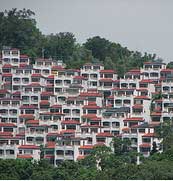Pro-tenant laws lead to avoidance

Taiwanese practice is PRO-LANDLORD, although the formal law would give tenants some security of tenure if it was followed (which is not).
Rents: Can landlord and tenant freely agree rents in Taiwan?
According to the Land Act, annual house rentals cannot exceed an amount equivalent to 10% of the total declared value of the property. For government-built housing, the rent cannot exceed 8% of the total value of the property. Land valuation is done annually for tax purposes. If the landlord intends to increase the rent upon renewal of the lease, then his tax liabilities will also increase.
Deposits
Most landlords collect security or damage deposits worth one to three months' rent. The deposit is usually returned to the tenant without interest upon termination of the contract. (Click here for a Model Tenancy Agreement)
However, The Land Act limits the amount of deposit to two months' rent, further, Article 98 of the act states that:
Where cash deposit is paid as security for the lease of a house, the interest on such cash deposit shall be deemed as part of the house rental.
The rate of interest referred to in the preceding paragraph shall be the same as that by which the house rental is computed.
 It works like this: to compute for the rent, the landlord takes the value of the property, let us say NT$1,200,000. If he uses the 10% limit, the rent is $120,000 annually, $10,000 per month. Then there is a deposit equivalent to two months' rent, $20,000. To compute for the interest included in the rent, you take the 10% of the deposit which is equivalent to $2,000 a year. The final rent to be paid monthly will be $9,833.
It works like this: to compute for the rent, the landlord takes the value of the property, let us say NT$1,200,000. If he uses the 10% limit, the rent is $120,000 annually, $10,000 per month. Then there is a deposit equivalent to two months' rent, $20,000. To compute for the interest included in the rent, you take the 10% of the deposit which is equivalent to $2,000 a year. The final rent to be paid monthly will be $9,833.
Actually, very few people observe the law strictly. The landlord states the rent, the amount of deposit, and the tenant must pay. The landlord usually deducts from the deposit payment for repairs of the unit.
What rights do landlords and tenants have in Taiwan, especially as to duration of contract, and eviction?
According to the law, the landlord can not take back his house unless one of the following conditions obtains:
- the owner takes the house for his own residence or for construction;
- the tenant subleases the house;
- the tenant fails to pay the rent for two months, i.e. the deposit has been used to counterbalance the amount in arrears;
- the tenant uses the house for illegal activities; and
- the tenant damages the houses and fails to pay due compensation.
There is ambiguity whether the landlord is entitled to take back his house when the contract expires. In practice, contracts require tenants to return the property to the landlord upon expiration of the contract.
In case of breach, the landlord should provide the tenant a written notice to terminate seven days before the eviction. The tenant is then required to pay the unpaid rent plus two months' rent as compensation for the loss and damage done to the landlord for the breach and termination.
If the tenant wishes to pre-terminate the contract, he is obliged to give a 30-day notice and pay a penalty amounting to one month's rent.
How effective is the Taiwanese legal system?
 Disputes regarding lease of a house are submitted to the respective Municipal or City Land Office for conciliation. Any party to the dispute who refuses to abide by the conciliation decision may bring the case before the judicial authorities for adjudication.
Disputes regarding lease of a house are submitted to the respective Municipal or City Land Office for conciliation. Any party to the dispute who refuses to abide by the conciliation decision may bring the case before the judicial authorities for adjudication.
In reality, the rental market is very informal. Although the law requires that the maximum deposit should be 2 months' rent, three months' rent is not uncommon. Contracts are not mandatory but they are readily available in 7-11 shops. It is actually very easy for the landlord to throw out his tenants.
Legislation
Chapter III (Articles 94 - 105) "Lease of Houses and Building Sites" of The Land Act covers rental agreements.